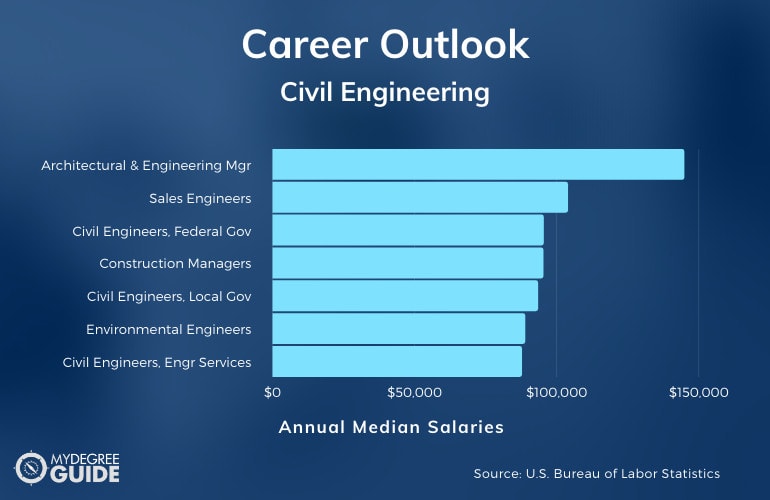Pursuing a masters in civil engineering online can be a strategic option if you’re serious about furthering your career in this field.

You may be able to find entry-level civil engineering positions with an on-campus or online bachelors in engineering degree. In order to be considered for more senior positions, though, a graduate degree is often required.
Editorial Listing ShortCode:
An online civil engineering master’s degree can give you an advantage when working towards a promotion, help you form professional connections, and qualify you for higher earnings.
Masters in Civil Engineering Online Programs

An online Master of Science in Civil Engineering can help open the door to leadership and management positions within specific sectors. It can also be used to pivot into another field of civil engineering that you may be interested in.
One benefit of most online civil engineering graduate programs is that they are flexible, much like you may find with an online masters in mechanical engineering, for example. You can go for a broader overview and explore multiple specialties, or you can cater your curriculum to one specific field that aligns with your career goals and personal interests.
For example, many accredited programs offer concentrations in construction engineering, structural engineering, geotechnical engineering, and hydrology. Some programs offer electives in even more specialized topics, such as wastewater management, air quality engineering, and sustainable design.
Editorial Listing ShortCode:
Your required courses often depend on what concentration you pick. Across all concentrations, coursework will rely heavily on fundamentals from mathematics, chemistry, physics, solid mechanics, fluid mechanics, and materials science.
Some programs culminate in a final thesis, and others may require an internship. In addition to getting an MS in Civil Engineering, a Professional Engineering (PE) license may be just as valuable for higher levels of employment.
Civil Engineering Careers & Salaries

After earning your online masters in civil engineering, you can pursue a variety of career paths. Graduates commonly move into engineering services roles under the umbrella of civil or mechanical engineering. If you chose to focus your degree on a specific sector, like hydrology, you may also look for positions in that specialized field.
According to the Bureau of Labor Statistics, the four most common specialties for civil engineers are construction engineers, geotechnical engineers, structural engineers, and transportation engineers.
| Careers | Annual Median Salaries |
| Architectural and Engineering Managers | $144,830 |
| Sales Engineers | $103,900 |
| Civil Engineers, Federal Government | $95,380 |
| Construction Managers | $95,260 |
| Civil Engineers, Local Government | $93,380 |
| Environmental Engineers | $88,860 |
| Civil Engineers, Engineering Services | $87,710 |
| Civil Engineers, State Government | $82,030 |
| Civil Engineers, Nonresidential Building Construction | $76,340 |
| Construction and Building Inspectors | $60,710 |
The Bureau of Labor Statistics projects 2% job growth for civil engineers over the next ten years. Other positions in related fields are projected to have higher than average job growth, like sales engineers (6%) and construction managers (8%).
Civil Engineering Master’s Curriculum

A typical civil engineering masters program contains a mix of both broad technical courses and courses that cover specific sectors. Here’s an overview of some courses you might take:
- Mechanics of Structures: A core foundation of civil engineering, mechanics of structures will cover stress, deformation, and stability analysis of various structures, such as beams, columns, and shafts.
- Fluid Mechanics: Another key prerequisite to just about any civil engineering discipline, this course covers static and dynamic behaviors of fluids when forces are applied to them.
- Construction Engineering: This course is a practical look at the design of systems, such as roads and bridges, as well as field operations methods, such as site layout and equipment selection.
- Structural Engineering: You’ll analyze and design complex structural systems and apply techniques to real-world applications, such as bridges, buildings, and tunnels.
- Geotechnical Engineering: This course covers engineering problems related to earth materials, including soil formation and characterization, as well as geotechnical site investigation techniques.
- Transportation Systems Engineering: You’ll study the design, operation, management, and economy of passenger and freight transportation systems.
- Hydrology: You’ll examine the movement and management of the earth’s water, including topics like the hydrologic cycle, precipitation, snowfall and snowmelt, flood routing, and urban applications.
- Environmental Engineering: This broader course gives an overview of different types of air and water contaminants as well as solutions in air and water quality engineering.
- Finite Element Methods: This mathematics-heavy course dives into differential equations and approximation theory as well as applications to structural analysis and fluid flow.
- Spatial Analytics: You’ll learn modern data analysis methods and how they apply to real-world transportation, energy, and location-based systems.
Certain courses, such as construction engineering, may also include field trips to work sites. You may also be required to write a final thesis or complete an internship to graduate.
Admissions Requirements

Specific admissions requirements will depend on each individual program, but the following are common criteria:
- Bachelor’s degree in civil engineering. Many programs stipulate that you have a bachelor’s degree in civil engineering, but others may accept related degrees or prerequisite courses.
- GRE or GMAT. Many programs are beginning to make the GRE or GMAT optional, so you may want to check with your school.
- Minimum GPA. A minimum GPA in previous college-level coursework may be required, with higher GPAs usually correlating with better chances of admission.
- Recommendation letters. Some schools request letters of recommendation from your past professors or industry managers.
It can help to become familiar with your prospective school’s particular admissions requirements before applying. A school’s admissions office is often available to answer any questions.
Accreditation

Regional accreditation provides a standard that lets students, families, and the wider public know that an institution meets a high educational bar.
While it may not be a fixed requirement for all employers, attending an accredited institution can help give you a competitive edge during the hiring process.
Choosing a civil engineering masters program that is regionally accredited can be especially important if you plan on seeking federal financial aid. You can refer to the US Department of Education‘s database of schools to find out if your program is accredited.
Financial Aid and Scholarships

You may be able to qualify for help with the cost of a master program in civil engineering via financial aid and scholarships.
If you’re currently working, you can check with your employer to see if the company has policies in place that support continued education. They may be able to fund some or even all of your tuition.
It is also possible for you to continue to work part-time while studying, which can also help cover costs. Depending on your preferences and goals, you can also opt to study part-time so you can continue working full-time.
Editorial Listing ShortCode:
Whether or not you’re currently employed, you can see if you’re eligible for federal or state grants. Unlike loans, these do not need to be repaid.
There are also many nonprofit and private organizations that offer scholarships. Some scholarships are targeted at students in a particular field, such as civil engineering, so you may be eligible for these right off the bat. Many, though, are also based on academic merit.
Finally, special aid programs may be available for military families. For more information on applying for financial aid, you can visit the official Federal Student Aid website.
Professional Civil Engineering Organizations

If you’re passionate about civil engineering, you may want to become involved with a professional organization. Here are a few that are well-established in the industry:
- American Society of Civil Engineers (ASCE)
- International Structural Engineering and Construction Society
- National Society of Professional Engineers
Joining an organization can help you network with like-minded civil engineers. It’s also a place to collaborate with others on coursework and to form valuable professional connections.
What Can You Do with a Masters in Civil Engineering?

After earning a Masters in Civil Engineering, graduates often pursue engineering services roles in many fields, including construction, geotechnology, and transportation.
A masters degree can also help increase your chances of landing a manager or engineering leadership position. Depending on your concentration, you can also choose to pursue work in a specific field, including structural engineering, environmental engineering, and marine engineering.
How Long Does It Take to Get a Masters Degree in Civil Engineering?

Depending on the program, a typical masters degree in civil engineering usually takes 1 to 2 years to complete. Some programs are extremely industry-focused and may be completed in 1 year if you pursue the degree full-time.
Others are more research-focused and can require a thesis in order to graduate. When following a traditional 16 week semester as a full-time student, these degrees usually take 2 years to finish. If you’re studying part-time, it may take you longer to complete your degree, depending on your course load each semester.
What Is the Difference Between Architecture vs. Civil Engineering?
Architecture and civil engineering are two adjacent fields, but there are some key differences.
- Architecture places a heavy emphasis on the design of buildings and interior space.
- Civil engineering is more broad, focusing not only on buildings but also on infrastructure, such as roads, bridges, tunnels, and dams.
In addition, architecture is often seen as a blend of technical design and art, offering more opportunities to express one’s creativity. Civil engineering is more concerned with utility and performance, making sure infrastructure is both sustainable and safe to use.
What Is the Difference Between Civil Engineer vs. Structural Engineer?
Structural engineering is generally classified as a sub-branch of civil engineering, but many consider it to be its own field because of how big it has become. A structural engineer typically specializes in the design and maintenance of load-bearing structures, such as buildings, patios, and bridges.
Editorial Listing ShortCode:
Civil engineering, on the other hand, is a more general discipline. For instance, a civil engineer may design railways and storm water retention systems, which don’t usually fit under the structural engineering umbrella.
What Is the Difference Between Civil Engineering vs. Environmental Engineering?

Environmental engineering is another adjacent field to civil engineering, and there is some overlap between the two.
Civil engineers are more involved with the end-to-end design and construction of a project. Environmental engineers usually focus on environmental issues, such as performing air and water quality control checks.
Environmental engineers may be tasked with ensuring that a civil engineering project is not causing too much harm to the natural environment. They may also recommend specific materials or processes that are more environmentally friendly.
Is a Masters in Civil Engineering Worth It?

Yes, a masters in civil engineering is worth it for many students. The Bureau of Labor Statistics projects 2% job growth for civil engineers in the next ten years.
The increasing shift towards renewable energy combined with rapid population growth means that civil engineers may continue to be called upon to build a more sustainable world. Also, a masters in civil engineering is flexible. It allows you the freedom to explore similar fields where your background can come in handy.
A graduate degree can help you qualify for higher earnings and senior or leadership positions as well.
Universities Offering Online Masters in Civil Engineering Degree Programs
Methodology: The following school list is in alphabetical order. To be included, a college or university must be regionally accredited and offer degree programs online or in a hybrid format.

Colorado State University offers a Master of Engineering with a specialization in Civil Engineering. This online program is a coursework-only master’s program. To graduate, students must complete 30 credits. Half of the credits must be in civil engineering, and at least 24 of the credits must come from Colorado State University.
Colorado State is accredited by The Higher Learning Commission, a Commission of the North Central Association of Schools and Colleges.

Louisiana State University offers an online Master of Science in Engineering program. To graduate, students must finish 36 credit hours.
Students interested in entering the program must have a bachelor’s degree in civil engineering and a 3.0 GPA. Students with a lower GPA may be considered for the program if they have work experience.
Louisiana State University is accredited by the Southern Association of Colleges and Schools Commission on Colleges.

The Michigan Technological University offers an online Master of Science in Civil Engineering program.
The program is designed with a focus on structural engineering and can typically be completed within 5 semesters. Interested students must have a relevant bachelor’s degree, a minimum 3.0 GPA, 2 letters of recommendation, and GRE scores.
Michigan Tech is accredited by The Higher Learning Commission.

North Carolina State University offers an online Master of Civil Engineering. The program requires that students complete 30 credits and has no thesis or project requirements. To graduate, students must maintain a 3.0 GPA. Interested applicants must have a bachelor’s degree in civil engineering and a GPA of 3.0 or higher.
North Carolina State University is accredited by the Southern Association of Colleges and Schools Commission on Colleges.

Ohio University offers an online Master of Science in Civil Engineering program. Students interested in the program must have a bachelor’s degree in civil engineering with a 3.0 GPA or a bachelor’s degree with a 2.5 GPA and 5 years of experience. The program may be started in the spring, summer, or fall.
Ohio University is accredited by the Higher Learning Commission.

Purdue University offers an online Master’s in Civil Engineering program. To graduate, students must complete 30 credit hours, with 15 credit hours related to civil engineering. To be eligible for the program, students must have a bachelor’s degree with a minimum 3.0 GPA and 3 letters of recommendation.
Purdue University is accredited by the Higher Learning Commission of the North Central Association of Colleges and Schools.

Stanford University offers an online Master of Science in Civil and Environmental Engineering program.
To graduate, students must complete 45 units within 5 years of starting the program. No thesis or research project is required. To be eligible for the program, students must have a bachelor’s degree in a related field.
Stanford University is accredited by the Accrediting Commission for Senior Colleges and Universities of the Western Association of Schools and Colleges.

The University of Illinois—Urbana Champaign offers an online Master of Science in Civil Engineering program. To graduate, students must complete 36 credit hours within 5 years of starting the program. When students start their degree, they may choose one of nine specializations to focus their studies on.
The University of Illinois at Urbana-Champaign is accredited by the Higher Learning Commission.

The University of North Dakota offers online engineering master’s programs for a Master of Science and a Master of Engineering in Civil Engineering.
Students intending to get the M.S may choose to take 32 credits to graduate or to write a thesis and take 30 credits. Students getting the M.Eng must obtain 30 credits and complete a Design Report to graduate.
The University of North Dakota is accredited by the Higher Learning Commission of the North Central Association of Colleges and Schools.

The University of Oklahoma offers an online Master of Science in Civil Engineering program. The program offers three tracks: Geotechnical Engineering, Structural Engineering, and Transportation Engineering.
The program starts in January and August each year and can usually be completed in 5 semesters. Students are expected to complete 2 to 3 courses per semester.
The University of Oklahoma is accredited by the Higher Learning Commission.
Getting Your Masters in Civil Engineering Online

Besides the career advancement opportunities, a masters degree allows you to really dive deep into subjects you are passionate about. You’ll may also have the chance to network with professors at the top of their fields and with students who share your similar aspirations.
If you’re wanting to advance as a civil engineer, enrolling in a masters in civil engineering online program can help you earn your degree according to your own schedule. You can begin this next step of your educational journey by exploring accredited universities and finding an online civil engineering degree program that aligns with your ultimate goals and interests.

